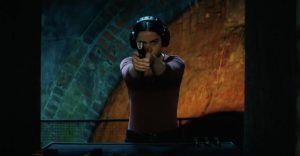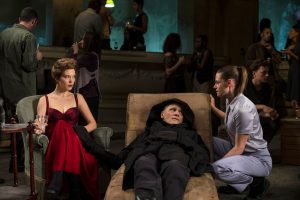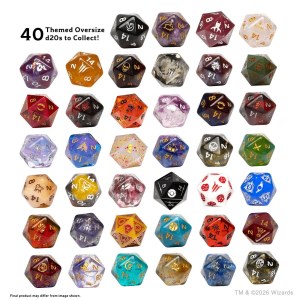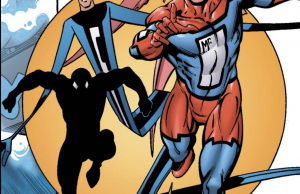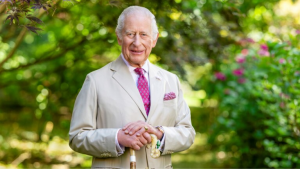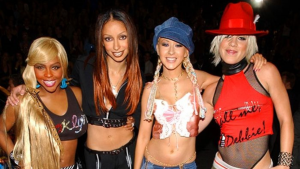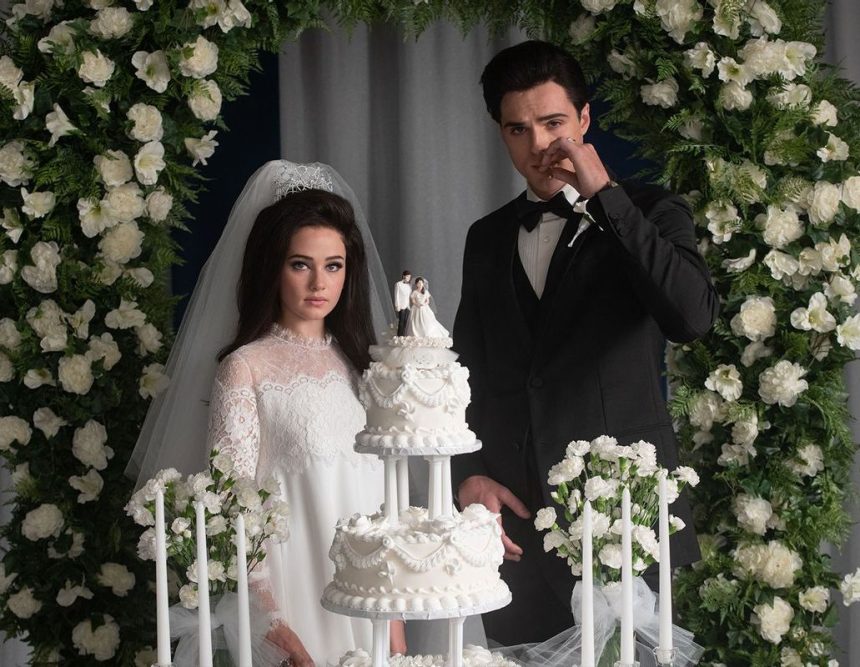
ANOTHER SIDE, ANOTHER STORY
In 2022, director Baz Luhrmann introduces the world of visual style of filmmaking with the release of Elvis. The movie, which starred Austin Butler and Tom Hanks as the main headliners of the feature, presented a biopic drama that centers around the life of musical sensation Elvis Presley, his stardom, his fall from grace, and the “behind the scenes” machinations that is manager, Colonel Tom Parker, did to his prized star’s success. The movie was met with generally positive reviews from critics, who praised the project for Bulter’s performance, and Luhrmann’s direction, the cinematography, costume design, production design, and musical sequences. In addition, the film received success and gained a modest return at the box office, with Elvis garnishing roughly $288 million (against its $85 million production budget) as well as being nominated during the award season that year, including being nominated eight times during the 95th Academy Awards. Now, following the success of cinematic representation of the “King of Rock and Roll”, A24 studios and director Sofia Coppola, present a new perspective from a different Presley in the movie appropriately titled Priscilla. Does this new cinematic look in Elvis’s wife provide insight into their relationship with each other or is it bland and too “artistic” endeavor to connect with viewers?
THE STORY
In 1959, Priscilla Beaulieu (Cailee Spaeny) is a fourteen-year-old teenage girl living in West Germany with her military family, feeling the isolation and boredom settling into her life. When she is suddenly approached by a man with connections to known musician Elvis Presley (Jacob Elordi), Priscilla is transported, giddy with excitement to spending time with the superstar heartthrob, who, in turn, fines an immediate attraction towards. The pair spend time to get to know each other before a lengthy break occurs as Elvis tends to his career, leaving Priscilla longing for Elvis. Years pass until the Priscilla is reunited with the man, who is more determined to keep the young girl by his side, using his charm to placate her parents. This results in Priscilla moving to Memphis, with the Priscilla becoming a resident at Graceland, won over by the musician passion, with the pair setting up a life together. However, the arrangement is soon fueled by drugs, distance, and jealous, with Priscilla left behind to complete her high school education, while Elvis works on his movie career in Hollywood, surrounded by beautiful, willing actresses looking to be attached to him. As the years pass, the relationship between Elvis and Priscilla is tested, with their eventually marriage facing a precarious road, with Priscilla’s eyes opened to her husband’s behavior as an unseeing resentment of him grows as his dark sided begins to consume their once happy relationship.
THE GOOD / THE BAD
There is no doubt about it that 2022’s Elvis was big hit. Director Baz Luhrmann did an incredible job of bringing such a unique and interesting towards the life of Elvis Presley, which showcased a young man of talent rise to fame and stardom, but being manipulated (behind the scenes) by his scheming manager. Naturally, the life of Elvis has been well-documented and examined throughout the decades since his passing, but Luhrmann, who is known for his visual style of filmmaking, provide a biopic project that was quite entertaining as well as being insightful into Elvis’s life and times throughout his career from singer, actor, and stage performer. Plus, there was no denying the fact that actor Austin Butler, who was mostly an unknown household name in the acting world, did an amazing job in the role as Elvis Presley, embodying the looks, movement, and his voice of the iconic talent. Hanks’s performance as Colonel Tom Parker was indeed a polarizing criticism amongst critics and moviegoers, with some liking it, while other felt it was too cartoony. Personally, I liked it. It was interesting to see what Hanks could do in a villain role and he played the part quite well. In the end, Luhrmann’s Elvis was a visually tour-de-force of filmmaking stylings, with the director’s intentions to show a sympathetic light of the iconic entertainer, the musical presence he brought to the world, and deception of evils (both inside and outside forces) that ultimately rose him up to stardom and consumed it utterly in his demise.
This brings me back around to talking about Priscilla, a 2023 drama film and the latest biopic endeavor to shed a light on different side of Presley’s life. As mentioned, following the wide acclaim and success that 2022’s Elvis received, I found it to be quite interesting to see another movie would be coming out (a year after) and would be focusing on the Elvis’s wife, Prisicilla, how their relationship that they had with each other, with the movie utilizing Priscilla’s 1985 memoir “Elvis and Me” the foundation base for the film. Plus, it was announced that director Sofia Coppola, the daughter of acclaimed director Francis Ford Coppola, would be attached to this project and would serve as director and screenplay writer for Prisicilla. After that initial announcement, I really didn’t hear much about the movie, with maybe the exception of actor Jacob Elordi being cast to play Elvis Presley in the upcoming project. It wasn’t until I saw the film’s movie trailer a few months back is when got my actual “first look” at the movie. From the preview alone, it looked okay-ish to me. The trailer didn’t quite have that “pizzaz” and looked like an arthouse / indie film, which being released from A24 seemed to the right way it was being presented, that I’m usually not fond of. I mean…. Spaeny and Elordi looked like Priscilla and Elvis, but I wasn’t too thrilled with the trailer. So, my interest in seeing this movie was low, but being directed by Sofia, I was curious to see what she could bring this narrative…. both old and new concepts. Thus, I decided to take a chance and went to see Priscilla a few weeks after its initial theatrical release on November 3rd (nationwide release). Due to my work schedule and the holidays, I had to wait a few more weeks after seeing the movie to get my review done for this movie. Now, with some free time, I am ready to share what I thought of this biopic feature. And what did I think of it? Well, it was just okay, but more on the disappointing side. While the story is interesting to see from a different perspective as well as the some relatively good performances from the main leads, Priscilla ends up a rather drab and boring character study film that’s too artistic in its cinematic flourishes and not enough gripping substance. It’s quite interesting to see what Priscilla had to endure in her relationship with Elvis (courtship and marriage) , but the movie doesn’t fully examine everything and becomes quite fragmented as the narrative progressives forward….and that’s not a good thing.
As mentioned, Priscilla is directed by Sofia Coppola, whose previous directorial works includes such films as Marie Antoinette, Lost in Translation, and The Beguiled. Given her reputation of filmmaking as well as father’s work, Coppola seemed like a suitable choice to helm a project like this, approaching the material with enough respect for the real life Priscilla Presley and the story that she told in her 1985 memoir. Unlike Luhrmann’s Elvis, Coppola shapes the film in a more grounded approach, with the intent of the feature having a “character study” feeling rather than a visual spectacle of the “life and times” of Elvis himself. To that end, the movie succeeds in bring viewers along in a cinematic journey of uncovering the life of Priscilla as she becomes entangled in Elvis’s life…. for better or worse. Coppola always keep the camera focus on Priscilla’s journey, showing her grow, mature, and confront the almost “mystifying” mystique that Elvis has on her and how she also comes to the realization that she is in a very “slippery slope” situation of being coupled with him. Of course, the life of Priscilla, much like Elvis, has been well-documented throughout the many years, with Coppola pulling back the veil to her the young woman’s side of things rather than focusing heavily on the “king of rock and roll”. It is for this reason why many look upon Priscilla (as a film) as an interesting piece, with Coppola clearly defining the character role of Priscilla herself as she becomes more and more entangled in Elvis’s lifestyle and fame, while trying to make sense of her involvement in his world.
Coppola understand this notion and gives the feature the necessary amount of character study examination make the whole endeavor give that “female empowerment” mantra throughout. To be sure, that’s not a bad thing as Priscilla did go through such an ordeal of some type of martial abuse while she was in a relationship with Elvis, so showcasing the evolution of a woman’s journey from starstruck young adolescent to a woman who takes charge of her own life is quite the interesting piece to examine. Why do I keep on mention this? Well, it is because this is main crux / focal point that Coppola sets up in the movie and certainly does make for some intriguing elements. In addition, Coppola puts on full display the attractiveness that many had with Elvis Presley when he’s around people (close friends and out in public), but also showcasing the more bizarre oddities he demonstrated as well as his temperament, lashing out when anyone challenged him on matters that considered him. Again, this goes back to the whole “martial abuse” that Priscilla went through and can be extrapolated by anyone (male or female or any other partner relationship) that can relate to such plights of strenuous ties that binds them together. Due to this nature that Priscilla feels for large portions of the story, Coppola also gives the feature a sense of dreamy-like mist and isolation loneliness. This type of juxtaposition aspect mirrors that feelings that Priscilla Presley must have felt (at least what Coppola wants to convey), displaying the rollercoaster “dream” experience of being coupled with such a famous popular musician such as Elvis, while feeling utterly closed off and isolated from him (and the rest of the world) during the moments where he is off performing, leaving a young woman to find comfort in her loneliness.
In its presentation, Priscilla is an effective project that certainly meets the “industry standards” of a biopic endeavor for a film of this particular subject matter and caliber. That’s not to say that the movie isn’t bad looking or looks cheap, but its not quite as “stylish” as other productions that depict such a biographical manner. I know that might sound a bit of negative point, but it isn’t. In truth, a blockbuster flair would actual be a detriment towards the feature as Coppola and her team downplay the heightened visual flairs of a feature film and instead goes with a more sensible and grounded in reality viewing experience, which gives the movie a sense of realism throughout. That’s not to say that Coppola and her team drum up some “cinematic” moments in the movie, but, as a whole, Priscilla is very much a more practical endeavor (presentation-wise) rather than Luhrmann’s stylish Elvis. Thus, the movie’s “behind the scenes”, including Tamara Deverell (production design), Danny Haeberlin (art direction), Patricia Cuccia (set decorations), and Stacey Battat (costume designs) for their efforts in bringing the movie’s world to life on the silver screen organically and life-like. In addition, the cinematography work by Phillipe Le Sourd does capture an interesting feeling in and out of the film’s presentation, which provides an almost “dreamy” mist of reality; something that is befitting for Priscilla’s story arc throughout the film. From close ups camera workings to a hazy effect of shadowing and lighting. Lastly, the film’s score, which was composed by Phoenix (Coppola’s husband band), is okay for the most part. It doesn’t quite hit all the correct notes by lacking the “movie soundtrack” quality that most projects are able to capture, but I do have to say that the group does provide some “dream-like” musical compositions throughout the movie, which does build upon what the cinematography efforts made on this picture.
Unfortunately, Priscilla doesn’t quite shine the proper way, with several key elements that hold the feature back from reaching cinema glory as well as drawing some criticism within its undertaking. How so? Well, I do have to say that the movie itself (beginning, middle, and end) is rather cold and lifeless. There is not really any type of warmth or energy that Coppola and her team drum up in the feature’s presentation / story, which renders the movie itself rather limp and distant. Most characters are rather shallow or only passible as “surface level”, glossing over their importance in Elvis / Priscilla’s lives in an uninteresting fashion, which makes them rather boring and unmemorable. The story’s presentation, while compelling at some points, leaves a lot to be desired and wanting more than what Coppola wants to convey on the film. Everything about Priscilla is just kept out of arms lengths and feels awkward because the insight we get (in a few pocket areas) seems rather cold, aloof, and just downright distant. Because of this notion, Coppola’s efforts are sort of undermined throughout much of the feature’s progression and leaves a rather hollow work that’s sad to say quite boring to watch. Yes, the allure and fascination of the whole affair between Priscilla / Elvis is intriguing and one that has great flair for the melodrama fanfare (ripe for a cinematic undertaking), but the efforts made by Coppola in how she shapes the movie is rather uninteresting and unbalanced. Sequences of Priscilla living “moment-to-moment” and doing small, daily things doesn’t sound quite riveting, which Coppola highlights a lot throughout the picture. Basically, there’s really nothing much going on in Priscilla, with Coppola, despite her filmmaking pedigree, generating a rather “lame duck” of the movie.
Also, I do have mention that the film itself is presented in a manner that is similar an arthouse / indie movie project endeavor, which can be seeing as both good and bad…. depending on the viewer. In my personal preference, I usually don’t particular care for this type of filmmaking projects. A lot of times (for me) …. they are too out there and linger too much certain sequences that really don’t play much important (i.e. more symbolism meanings and filmmaking callbacks of college movies 101). Priscilla is presented as such, with the feature being part of A24, a studio that is quite known for their arthouse style picture releases. So, while I do understand why some people will like this movie for that particular reasoning and filmmaking style, the movie just doesn’t do much for me in this regard, with Coppola spending too much time trying to make Priscilla emulate that artistic flavoring of an arthouse presentation rather than trying to entice viewers with a more “energetic” film.
Another problem that Coppola does with the movie is in the script / screenplay as the director plays “double duty” on Priscilla as both helmer and writer for this bio pic. Adapting a book’s material, especially one that is based on a true story account, be can slightly problematic, considering all the substance and pivotal moments that must be presented in a motion picture, which unto itself can be a daunting task indeed. This seems to be the case with Priscilla as Coppola struggles to encompass everything about the woman’s life into one movie. Yes, she does get some elements in a correct manner, especially in the first act where courtship between Priscilla and Elvis is elaborate on, but pretty much everything else is seems rather fragmented and clunkily handled. Moreover, the movie’s script merely glosses over much of these moments in rather rushed manner, examining such details rather quickly before moving onto something else. Such “surface level” details can be felt throughout the movie. Heck, Coppola decides to make Elvis’s manager (Colonel Tom Parker) off-screen for the entire feature, even though the script name drops him here and there. This also includes several other contexts into Elvis’s life that aren’t fully fleshed out, which renders the famous celebrity rather awkward and ambiguous to say the least.
Lastly, the film’s ending feels rather rushed and incomplete, ending on a rather perplexing way to close out the feature on. I do understand why Coppola decides to end the movie on this particular notion (thematically speaking), but it’s a bit clunkily handled and ends rather abruptly, leaving many viewers “scratching their heads” when the movie’s credits begins to roll. Plus, there’s clearly more to the tale being told, so closing the movie out on this part of Priscilla’s story, while poignant, ends up rather incomplete and haphazardly done, leaving to believe that Coppola didn’t know exactly when and where to end Priscilla on.
The cast in Priscilla is a mixed bag of sorts, with the acting talent able (and willing) to play such real-life characters that played in and out of both Elvis and Priscilla’s lives, but, given how the movie is presented, most of them get lost and are, more or less, “window dressing” for the feature, especially since so much attention is given to the two leads. One of the two leads, who is the true main focus of feature, is the character of Priscilla Presley, who is played by actress Cailee Spaeny. Known for her roles in Pacific Rim: Uprising, On the Basis of Sex, and Bad Times at the El Royale, Spaeny has appeared in several projects here and there, but is slowly becoming a bit more recognizable in some of her recent endeavors. Giving her the right positioning for the lead role, Spaeny gets her chance to shine in this movie and does indeed do a good job in the role. As mentioned previously, the movie showcases the transformation / maturity that Priscilla goes through and Spaeny does deliver that quite well in her performance. I would even go as far as to say that her role as Elvis’s wife is perhaps the best performance she has given in her career (so far). Her character arc journey is quite defined throughout the feature as Spaeny demonstrates her acting chops beautifully, showing the different phases Priscilla’s life from shy teenager to confident adult. The film is clearly made for Spaeny, who does imbue her talents in the character role and does give the proper forthcoming nuances to hold steadfast throughout much of the feature, even if the movie itself (as mentioned) is quite cold and distant. Still, Spaeny’s performance as Priscilla is perhaps one of the greatest strengths that project has to offer and does certainly carry the picture’s weight on her shoulders.
Behind Spaeny, actor Jacob Elordi takes the lead in the role of the famous “king” in Priscilla as Elvis Presley. Known for his roles in The Kissing Booth, Euphoria, and Saltburn, Elordi has slowly become more and more of a popular candidate for a “good looking” male lead / supporting character in various projects, becoming a “up and coming” actor for the younger generation talents. Thus, it comes as no surprise that he was awarded the honor of playing the role of Elvis in Priscilla, with Elordi having the right dashing good looks to pull off the handsome / charming appeal that every young person had with the talented musician. Though, given the context of the feature’s substance, Elordi doesn’t get the right direction of how to make Elvis come alive and unto his own, with his portrayal “going through the motions” of bizarre and evil consumptions tendencies that Elvis has in his life. Again, like I said above, it’s interesting, but not given much substance to fully realize everything about the musical sensation. For his part, Elordi does a good job, especially in the beginning part, but becomes a bit too cartoony at times, which was mostly from Coppola’s direction.
I do agree that both Spaeny and Elordi share a good on-screen chemistry with each other, which does sell the whole relationship journey that their characters have throughout the movie. However, when comparing Elordi’s performance to Bulter’s performance in the role of Elvis, there is no doubt about it that Butler is stronger representation. Yes, I do understand that Butler had more of a lead role in the movie, while Elordi is more secondary lead, with Spaeny being the film’s true protagonist. That being said, Butler has a more screen presence and is far more magnetic in his charm and Elvis persona than what Elordi was able to achieve.
Unfortunately, the rest of the cast, including actor Tim Post (Enemy and Mambo Italiano) as Elvis’s father Vernon Presley, actress Lynne Griffin (Curtains and Dream House) as Elvis’s grandmother Grandma “Dodger”, actor Dan Beirne (Ginny & Georgia and Fargo) as Joe Esposito, actor Rodrigo Fernandez-Stoll (Ghosts and Blackberry) as Alan “Hog Ears”, actor Dan Abramovici (Ben’s at Home and The Marsh’s King Daughter) as Jerry Schilling, actor R Austin Ball (The End of Sex and The Last Day) as Larry Geller, actress Olivia Barrett (Saving Hope and Designated Survivor) as Graceland’s cook Alberta, actor Luke Humphrey (Chateau Laurier and See) as Terry West, actress Deanna Jarvis (Too Close for Christmas and Reign) as Carol West, actor Evan Annisette (Reacher and Locke & Key) as Mike Stone, and actor Ari Cohen (IT and Maps to the Stars) and actress Dagmara Dominczyk (Succession and They) as Priscilla’s parents Captain Paul and Ann Beaulieu, are woefully underdeveloped throughout much of the film’s context and presentation. It’s not for a lack of trying from the talents that play them (all do solid jobs in their performances of acting), but Coppola’s decision to focus too much on Spaeny and Elordi’s characters chews up any type of screen presence that these players have to offer in the film’s narrative. Thus, these supporting characters (some who do play a part in Elvis / Priscilla’s lives) come off as one-note and forgettable, especially since the movie never allows them to grow and / or have enough time to make a lasting impression on the film, which is hugely disappointing.
FINAL THOUGHTS
The story of Elvis Presley, the proclaimed “king of rock and roll” has been well-documented and well-received throughout media facets, but now is the time to share another story from a different perspective in the movie Priscilla. Director Sofia Coppola’s latest film takes examinational look into the Priscilla Presley’s life, showcasing the chance meeting of Elvis, their budding relationship with each other, and the unevenness in their indifference with each other towards the end of their marriage. It’s a character study of love, isolation, and uncompressing faith in oneself that is surrounded by fame, stardom, and unquenchable desire of tempered outbursts. While the story is technically there (and quite eye-opening) as well as strong performance from Spaeny, the movie does suffer from being a bit too artistic and mundane, which derives from the feature’s direction, sluggish pacing, lack of substance in its script, and otherwise forgettable side / supporting characters. Personally, I felt that this movie was decently okay, but rather boring and slightly disappointing. I give credit where credit is due in showcasing a different side of the Elvis / Priscilla Presley narrative and the almost isolation feeling (as well as the maturity) that the wife of a talented musician faced in her life, but the movie itself was presented rather bland and not much excitement, leaving a lot to be desired within its otherwise weak plot substance. It was interesting, but nowhere nearly as entertaining, engaging, or memorable as Luhrmann’s Elvis. Thus, my recommendation for this movie would have to be a “iffy choice” as some out there will probably like it, especially those who love indie-style films and / or A24’s releases, while others (those like me) won’t simply get it and find the whole endeavor rather moot and vanilla. In the end, Coppola’s Priscilla is a paradox unto itself, delving into a young woman’s duality of being married to “the king”, yet feels cold and empty within both its presentation and isolation in this tale of “another side, another story” cinematic examination.
3.0 Out of 5 (Iffy-Choice)
Released On: October 27th, 2023
Reviewed On: January 20th, 2024
Priscilla is 114 minutes long and is rated R for drug use and some language
